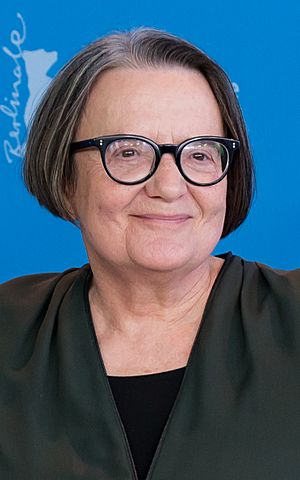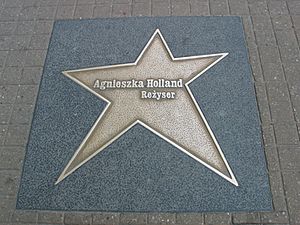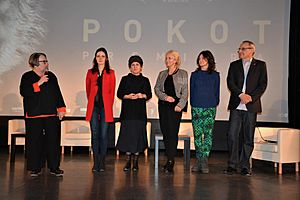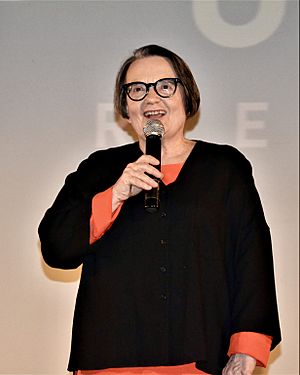Agnieszka Holland facts for kids
Quick facts for kids
Agnieszka Holland
|
|
|---|---|

Holland in 2017
|
|
| Born |
Agnieszka Holland
28 November 1948 Warsaw, Poland
|
| Alma mater | Film and TV School of the Academy of Performing Arts in Prague |
| Occupation | film and television director, screenwriter |
| Years active | 1973–present |
|
Notable work
|
Europa Europa (1991) In Darkness (2011) Spoor (2017) Green Border (2023) |
| Spouse(s) | Laco Adamík (divorced) |
| Children | Kasia Adamik |
| Relatives | Magdalena Łazarkiewicz (sister) |
| Signature | |
 |
|
Agnieszka Holland (born 28 November 1948) is a famous Polish director and screenwriter for movies and television. She is known for making important films that explore Polish culture and history. She started her career helping famous directors like Krzysztof Zanussi and Andrzej Wajda. She moved to France just before the Polish government declared martial law in 1981, a time of strict military control.
Holland is famous for her powerful films. Her 1990 film Europa Europa won a Golden Globe Award and was nominated for an Academy Award. She also directed the popular movie The Secret Garden in 1993.
Many of her films, like Angry Harvest and In Darkness, have been nominated for the Academy Award for Best Foreign Language Film. In 2017, her film Spoor won a Silver Bear award at the Berlin International Film Festival. In 2023, her film Green Border won a Special Jury Prize at the Venice International Film Festival.
Holland's movies often tell stories about individuals caught in major political events. She frequently explores difficult historical topics, such as the crimes committed during World War II and under communist governments.
Contents
Early Life and School
Agnieszka Holland was born in Warsaw, Poland, in 1948. Her parents, Irena and Henryk Holland, were both journalists. Her mother was Roman Catholic and her father was Jewish. Holland's mother was part of the Polish resistance during the Warsaw Uprising in 1944. She also helped Jewish people during the Holocaust and was later honored as one of the Righteous Among the Nations by Israel.
Holland's father was a journalist involved in the politics of the time. He passed away when she was thirteen years old.
After high school, Holland went to the Film and TV School of the Academy of Performing Arts in Prague (FAMU) in Czechoslovakia. She was inspired by the interesting Czech films of the 1960s. While studying in Prague, she witnessed the Prague Spring in 1968, a period when people demanded more freedom. She was arrested for supporting this movement. This experience in Prague was very important for her, shaping her views on politics, art, and life.
Holland graduated in 1971 and returned to Poland. She began working with the famous director Andrzej Wajda, who became her mentor. Her daughter, Kasia Adamik, is also a film director.
Career as a Filmmaker
Holland started her career as an assistant director for Krzysztof Zanussi and Andrzej Wajda. She learned a lot from working on their films, like Wajda's Man of Marble. At first, because of government censorship, she couldn't release movies under her own name.
Her first major film as a director was Provincial Actors (1978). It was about the drama among actors in a small theater, but it was also an allegory—a story with a hidden meaning—about the political situation in Poland. The film won an award at the 1980 Cannes Film Festival.
After directing two more films, Holland moved to France in 1981. The Polish government would not let her return home for some time. While in France, she wrote scripts for other Polish directors and also directed her own movies, including Angry Harvest (1985), which was nominated for an Academy Award.
Films About the Holocaust
Some of Holland's most important films are about the Holocaust, the period during World War II when millions of Jewish people were killed. Her films are known for being realistic and showing the complex and difficult choices people had to make.
Her most famous film on this topic is Europa Europa (1991). It tells the true story of Solomon Perel, a Jewish teenager who survived the war by pretending to be German and joining the Hitler Youth. The film was a huge success, winning a Golden Globe Award and an Oscar nomination.
In 2011, she directed In Darkness. This film tells the story of a Polish sewer worker in the city of Lwów who hides a group of Jewish refugees in the city's sewers to save them from the Nazis. The film shows how different people, both Polish and Jewish, acted during this terrible time.
Working in Hollywood
The success of Europa Europa brought Holland to the attention of Hollywood. This gave her the chance to direct the 1993 movie adaptation of the classic book The Secret Garden. This was a big change for her, as it was a family film made for a large American audience, unlike her earlier, more political films.
Later Career
Holland continued to make a wide variety of films, including Olivier, Olivier (1992), Total Eclipse (1995), and Copying Beethoven (2006). She also directed episodes for popular American TV shows like HBO's The Wire and House of Cards.
In 2013, she directed Burning Bush, a miniseries for HBO about Jan Palach, a student who protested the Soviet invasion of Czechoslovakia in 1969.
Her 2017 film Spoor won the Silver Bear award at the Berlin Film Festival. In 2019, her film Mr. Jones won the top prize at the Gdynia Film Festival. The movie is about the Holodomor, a terrible famine in Ukraine in the 1930s. For her work in telling this story, she was given an award by the President of Ukraine, Volodymyr Zelensky.

Her 2020 film Charlatan was chosen as the Czech entry for the Academy Awards and made the shortlist of nominees.
In 2023, her film Green Border premiered at the Venice Film Festival and won the Special Jury Prize. The film tells the story of migrants trapped at the border between Belarus and the European Union. The film caused a lot of debate and was criticized by some Polish government officials.
Holland has received many honors for her work. In 2023, she received a Career Achievement Award from the Los Angeles Film Critics Association and an honorary doctorate from the National Film School in Łódź. Her next project is a film about the writer Franz Kafka called Franz.
Filmography
- Jesus Christ's Sin (Grzech Boga, 1970)
- Evening at Abdon's (Wieczór u Abdona, 1975)
- Pictures from Life: A Girl and Aquarius (Obrazki z życia: dziewczyna i "Akwarius", 1975)
- Sunday Children (Niedzielne dzieci, 1977)
- Screen tests (Zdjęcia próbne, 1976)
- Something for something (Coś za coś, TV movie, 1977)
- Provincial Actors (Aktorzy prowincjonalni, 1979)
- Fever (Gorączka, 1980)
- A Lonely Woman (Kobieta samotna, 1981)
- Postcards from Paris (TV film, 1982)
- Culture (documentary, 1985)
- Angry Harvest (Bittere Ernte, 1985)
- To Kill a Priest (1988)
- Europa Europa (1990)
- Olivier, Olivier (1992)
- The Secret Garden (1993)
- Red Wind (TV movie, 1994)
- Total Eclipse (1995)
- Washington Square (1997)
- The Third Miracle (1999)
- Shot in the Heart (2001)
- Golden Dreams (documentary, 2001)
- Julie Walking Home (2002)
- Cold Case (2004)
- Copying Beethoven (2006)
- The Wire
- Episode 3.08 "Moral Midgetry" (2004)
- Episode 4.08 "Corner Boys" (2006)
- Episode 5.05 "React Quotes" (2008)
- A Girl Like Me: The Gwen Araujo Story (2006)
- Ekipa (2007)
- Janosik: A True Story (Prawdziwa historia, 2009)
- The Killing
- Episode 1.06 "What You Have Left" (2011)
- Episode 1.09 "Undertow" (2011)
- Episode 2.01 "Reflections" (2012)
- Treme
- Episode 1.01 "Do You Know What It Means" (2010)
- Episode 1.10 "I'll Fly Away" (2010)
- Episode 2.10 "That's What Lovers Do" (2011)
- Episode 4.05 "...To Miss New Orleans" (2013)
- In Darkness (2011)
- Burning Bush (2013)
- Rosemary's Baby (2014)
- House of Cards
- Episode 3.10 "Chapter 36" (2015)
- Episode 3.11 "Chapter 37" (2015)
- Episode 5.10 "Chapter 62" (2017)
- The Affair
- Episode 3.6 (2015)
- Spoor (2017)
- The First
- Episode 1.01 "Separation" (2018)
- Episode 1.02 "What's Needed" (2018)
- Mr. Jones (2019)
- Charlatan (2020)
- Green Border (2023)
- Franz (2025)
Other work
Agnieszka Holland translated the novel The Unbearable Lightness of Being by Milan Kundera from Czech into Polish. She wanted Polish readers to experience the book because its story reminded her of events in both Czechoslovakia and Poland.
In 2023, she also appeared as a guest star in the Polish Netflix series Absolute Beginners.
Images for kids
See also
 In Spanish: Agnieszka Holland para niños
In Spanish: Agnieszka Holland para niños
- List of female film and television directors
- List of LGBT-related films directed by women
- Cinema of Poland
- List of Poles
- List of Polish Academy Award winners and nominees
 | George Robert Carruthers |
 | Patricia Bath |
 | Jan Ernst Matzeliger |
 | Alexander Miles |




